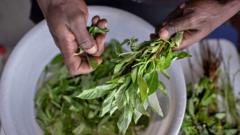During the weeks leading up to Norway's National Day on May 17, students indulge in night-long celebrations aboard festive "russebuss" (party buses), leading to worries about heavy drinking, drug use, and the financial burden it places on families. Norwegian authorities, including Prime Minister Jonas Gahr Støre and Minister of Education Kari Nessa Nordtun, have acknowledged the issues stemming from this party culture and are advocating for reforms to ensure post-exam celebrations and decrease peer pressure.
The bus tradition, which began in Oslo in the early 1980s, has expanded nationally, with many groups spending exorbitant amounts—up to £220,000—on food and entertainment. These trends have prompted calls for inclusive yet safe celebrations, counteracting the rising exclusivity and debt among participants.
While some students express disappointment over impending reforms, many see the need for a balance between celebration and academic duty. The government is poised to change the current course of russetid celebrations, aiming for a healthier, less commercialized experience for all Norwegian school leavers.
As authorities plot a course forward, the scrutiny on the russebuss culture may very well reshape one of Norway's most revered traditions.
---
Norwegian school leavers are facing scrutiny as excessive partying on party buses has raised alarms among parents, educators, and government officials due to its negative impact on wellbeing and exams.
The tradition of "russetid," marked by colorful overalls and party buses, has drawn concerns about social inclusion and debt, leading to proposed reforms aimed at a safer celebration environment for students.
The bus tradition, which began in Oslo in the early 1980s, has expanded nationally, with many groups spending exorbitant amounts—up to £220,000—on food and entertainment. These trends have prompted calls for inclusive yet safe celebrations, counteracting the rising exclusivity and debt among participants.
While some students express disappointment over impending reforms, many see the need for a balance between celebration and academic duty. The government is poised to change the current course of russetid celebrations, aiming for a healthier, less commercialized experience for all Norwegian school leavers.
As authorities plot a course forward, the scrutiny on the russebuss culture may very well reshape one of Norway's most revered traditions.
---
Norwegian school leavers are facing scrutiny as excessive partying on party buses has raised alarms among parents, educators, and government officials due to its negative impact on wellbeing and exams.
The tradition of "russetid," marked by colorful overalls and party buses, has drawn concerns about social inclusion and debt, leading to proposed reforms aimed at a safer celebration environment for students.



















